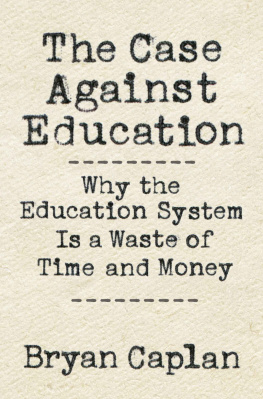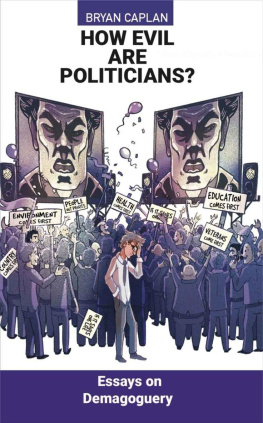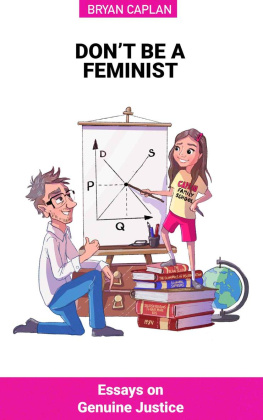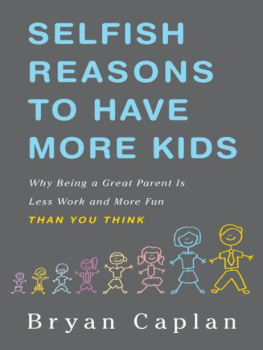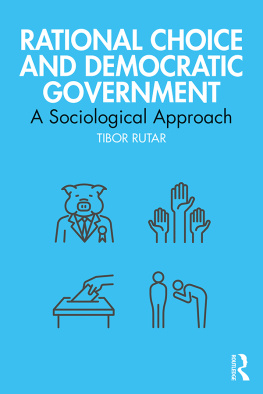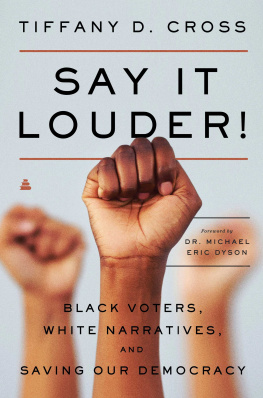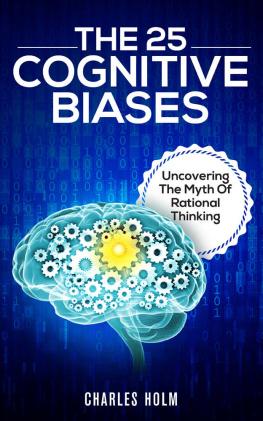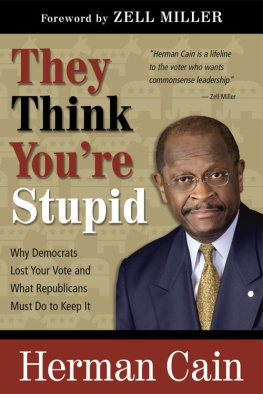THE MYTH OF THE RATIONAL VOTER
THE MYTH OF
THE RATIONAL VOTER
WHY DEMOCRACIES CHOOSE BAD POLICIES
With a new preface by the author
BRYAN CAPLAN

Copyright 2007 by Princeton University Press
Published by Princeton University Press, 41 William Street, Princeton,
New Jersey 08540
In the United Kingdom: Princeton University Press, 6 Oxford Street,
Woodstock, Oxfordshire OX20 1TW
All Rights Reserved
Seventh printing, and first paperback printing, with a new preface by the author, 2008 Paperback ISBN: 978-0-691-13873-2
The Library of Congress has cataloged the cloth edition of this book as follows
Caplan, Bryan Douglas, 1971
The myth of the rational voter : why democracies choose
bad policies / Bryan Caplan.
p. cm.
Includes bibliographical references and index.
ISBN-13: 978-0-691-12942-6 (cloth : alk. paper)
ISBN-10: 0-691-12942-8 (cloth : alk. paper)
1. Economic policy. 2. Democracy. 3. Political sociology. 4. Representative government and representation. 5. Rationalism. I. Title.
HD87.C36 2006
320.6dc22 2006030855
British Library Cataloging-in-Publication Data is available
This book has been composed in Utopia
Printed on acid-free paper.
press.princeton.edu
Printed in the United States of America
10 9 8 7
The serious fact is that the bulk of the really important
things economics has to teach are things that people
would see for themselves if they were willing to see.
Frank Knight, The Role of Principles
in Economics and Politics
I have often wondered why economists, with these absurdities
all around them, so easily adopt the view that men
act rationally. This may be because they study an economic
system in which the discipline of the market ensures
that, in a business setting, decisions are more or less
rational. The employee of a corporation who buys something
for $10 and sells it for $8 is not likely to do so for
long. Someone who, in a family setting, does much the
same thing, may make his wife and children miserable
throughout his life. A politician who wastes his countrys
resources on a grand scale may have a successful career.
Ronald Coase, Comment on Thomas W. Hazlett
[T]he superstitions to be feared in the present day are
much less religious than political; and of all the forms of
idolatry I know none more irrational and ignoble than this
blind worship of mere numbers.
William Lecky, Democracy and Liberty
CONTENTS
PREFACE TO THE PAPERBACK EDITION
The Myth of the Rational Voter was far more successful than I had expected. The real surprise, though, was how reasonable the critics have been. Admittedly, I aimed for broad appeal. From the start, my goal was to transcend disciplinary and ideological boundariesto find some common ground for people with common sense, and build on it. But I was skeptical that my outreach would be successful. After all, the book does not take a contrarian position in a dry academic debate; it questions the dogmas of the secular religion of democracy, and prods the reader to leave the church.
Apparently, many prominent thinkers were already quietly questioning these dogmas. I half expected the Economist to confess to doubts about voter rationality, but I was shocked when Nicholas Kristof named it the best political book this year in the New York Times. Most reviews were less enthusiastic, but only a few claimed that voters are rational, or stood up for what I call popular economic misconceptions. Although several colleagues at George Mason have criticized my elitism, my real mistake was underestimating how fair elite critics would be.
Still, almost every reviewer posed objectionssome of which were quite consistent with my thesis, or even implied by it. The Economist was right to joke that [Caplans] book is a treat, but he will never win elective office. I also sympathize with its claim that Caplan is better at diagnosis than prescription, but I would rephrase the objection. You should not blame the prescription simply because the patient refuses to take his medicine. The Myth of the Rational Voter contains many workable reforms, but due to voter irrationality they are unlikely to be tried.
This does not mean that nothing can be done; the book is not a plea for fatalism. But progress is likely to come slowly, if it comes at all. There is some slack in the democratic system. As the final chapter explains, if you want to push policy in a more sensible direction, you can take advantage of this slack. I know I do: I doubt the voters of Virginia want me to write and lecture against popular misconceptions, but for reasons that remain a mystery, they cut me enough slack to do so.
Another common criticism is that I ignore the symbolic and/or legitimating power of democracy. As Louis Menand writes in the New Yorker,
Complaints like this miss a point that I make repeatedly throughout the book: democracy comes in degrees. We do not have to choose between abandoning democracy and tolerating whatever foolish policies the majority favors. The American polity has been quite stable despite the existence of supermajority rules, the Supreme Court, and independent agencies like the Federal Reserve. Democracy could be far more limited than it is now without risking civil unrest.
A few critics practically see my project as self-contradictory. If my premise is that the economic consensus is reliable, how can I reach a conclusion that the economic consensus rejects? As Christopher Hayes colorfully puts it,
[T]he book eats its own tail. Caplan wants to grant a presumptive authority to the consensus view of economists, but the consensus view of economists is that voters are rational, which is, of course, precisely the position he wants to convince us is wrong.
This complaint would be airtight if my premise were that the economic consensus is infallible. But my actual premise is merely that economists, like other experts, deserve the benefit of the doubtand that the burden of proof rests on those who question the expert consensus. Since the rational voter assumption is part of that consensus, my responsibility as a naysayer is to refute itwhich is precisely why I needed to write the book.
The most serious criticism of my work is also the strangest. A number of criticssuch as Daniel Casse in the Wall Street Journaldeny that popular misconceptions actually influence policy.
[N]owhere in The Myth of the Rational Voter does Mr. Caplan demonstrate that dumb voter bias triggers bad public policy.
Take free trade. Mr. Caplan reports that support for free trade hit bottom in 1977, when only 18% of Americans favored eliminating tariffs. Yet three years later, Ronald Reagan campaigned on a platform of free trade and proceeded to sign historic free-trade agreements with Canada and laid the groundwork for free trade with Mexico.
In effect, he defends democracy by saying that the voice of the people falls on deaf ears.
The Myth of the Rational Voter explicitly states that democracies policies are better than you would expect given public opinion. But this does not imply that public opinion is unimportant. If voter bias has no effect on policy, why were extensive protectionist measures adopted in the first place? Why does protectionism remain after three decades
Next page

